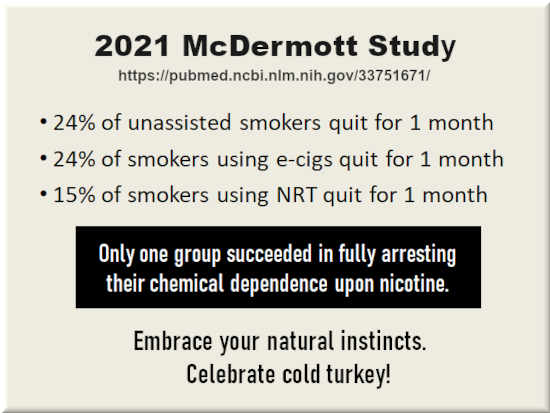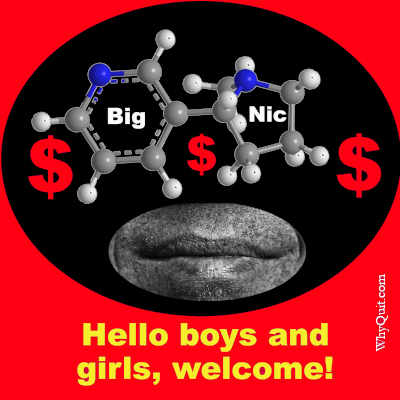
"Big Nic" profits from non-cessation transfer studies
March 31, 2021 John R. Polito
A new e-cigarette stop smoking study is the latest example of how an army of researchers unwittingly assists the nicotine industry in obscuring recovery.
Acetaldehyde, methanol, formaldehyde, acetone and isobutanol are impurities found in alcohol. Reflect on the sanity of studies comparing alcoholics who succeed in quitting cold turkey to those who stopped drinking dirty alcohol by successfully transferring to significantly cleaner brands containing far fewer impurities?
A March 2021 UK study by McDermott MS, et al, published in Addiction, concluded that "When used daily, electronic cigarettes appear to facilitate abstinence from smoking when compared with using no help." It's also the featured finding in their King's College study press release.
The study compared five consecutive years of survey responses (2012-2017) that generated 1,580 qualified stop smoking attempts that resulted in 359 former smokers. Success was defined as abstinence from smoking for at least 1 month at the next survey follow-up.
Astonishingly, the McDermott study all but ignores the fact that among the 203 responders most likely to have ended nicotine use and fully arrested their chemical dependence (168 unassisted quitters, 23 medication quitters, and 12 e-cigarette quitters who had stopped using e-cigs at follow-up) that 83 percent did so unassisted ("no-help").
The McDermott study summary (abstract) also omits the super newsworthy finding that cold turkey was at least 62% more effective than NRT (replacement nicotine), 24.4 percent vs. 15.3 percent.
Has a once noble quest for harm reduction via delivery device transfer totally perverted the meanings of cessation and quitting?
Imagine those attending AA meetings arriving drunk while professing to have quit. From a dependency recovery perspective, nicotine versus no nicotine study arms and findings are sham.
McDermott's primary finding celebrates the obvious. Sufficient transfer nicotine (daily e-cigarette use) increases the likelihood of successful transfer. But should "real" quitting be ignored when 89 percent of the study's successful transfers remained hooked and using (94 of 106)?
The neo-nicotine industry's business model is rooted in addicting the acetylcholine receptors of young gullible brains to nature's most potent insecticide. The basic intro message that science should have been shouting -- before harm reduction -- is that all forms of nicotine delivery are addictive, unsafe and dangerous.
Dawn to dusk devotion to servicing nicotine's two-hour elimination half-life, as modified by the addict's level of need (tolerance), is it any wonder that 62.4 percent of e-cig users wish they could quit?
So, now that well-intended yet reckless harm reduction advocacy has contributed to half of all e-cig users both vaping and smoking (the 2019 UK dual use rate), and millions of addicted teens, what's the cure for the cure?
More of the same, the McDermott study's inhale more nicotine "abstinence" assurance? Hundreds of additional placebo-controlled clinical trials that can't pass basic blinding integrity assessments? New forms of nic delivery from Big Nic?
Defined as "abrupt complete cessation of the use of an addictive drug," cold turkey has reigned as quitting's king for at least 5,000 consecutive years.
It appears that none of the four McDermott study authors have any published papers on the key to successful abrupt nicotine cessation. Professing to be "cessation" experts, do any of them know what the key is?
If so, why keep it secret? If not, why zero studies focused on the "cessation" winner maligned by your study?
The answer was hinted at by your finding that the odds of achieving one month of abstinence were increased by having made a previous quit attempt more than six months previously. What lesson was learned from that prior attempt and why can't that lesson be taught/learned prior to their first attempt ever?
Thirty-three years ago (1988), Joel Spitzer termed it "The Law of Addiction" (supporting relapse studies).
It's vastly easier to remain obedient to Big Nic group-think in simply documenting how technology and chemistry are gradually increasing successful transfer of an active mental illness to cleaner delivery, than risk suffering peer admonishment for helping the giant turkey in the room grow bigger.
It makes the two words chosen by the study to describe cold turkey quitters rather fitting: "no-help."
I, John R. Polito, am fully and solely responsible for the content of this article. Any factual error will be promptly corrected upon notice emailed to john@whyquit.com



